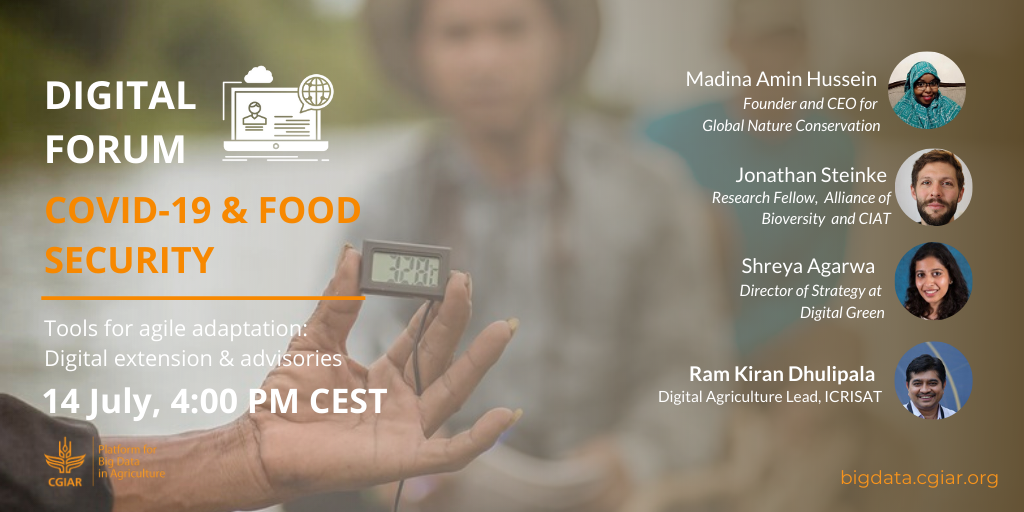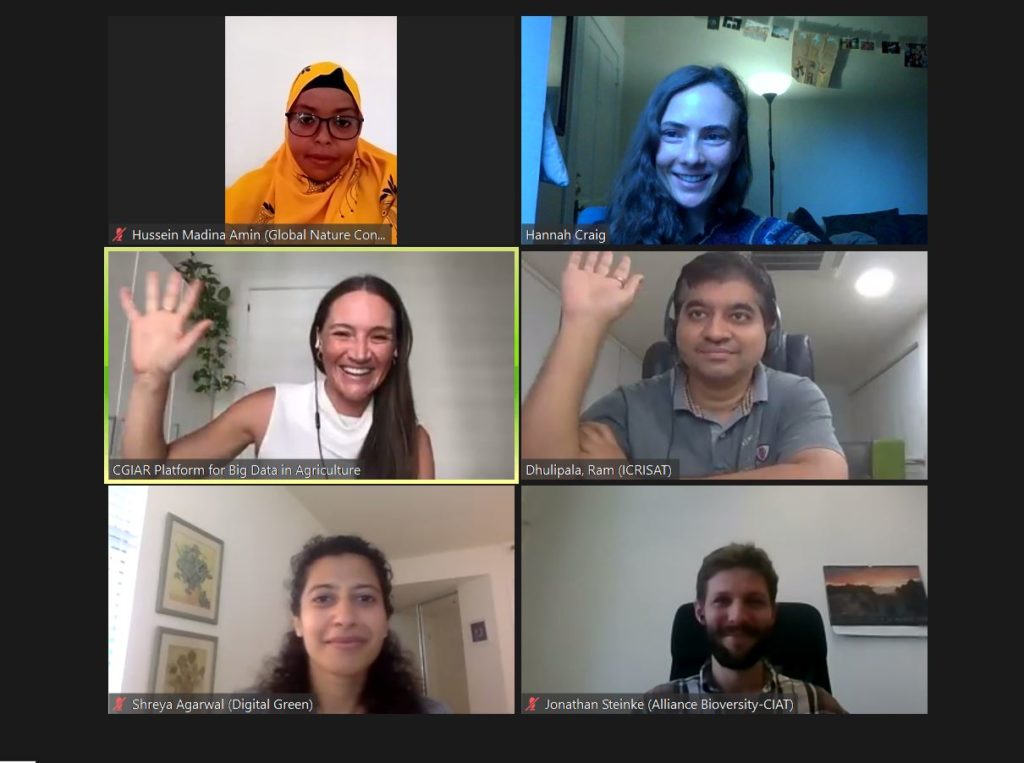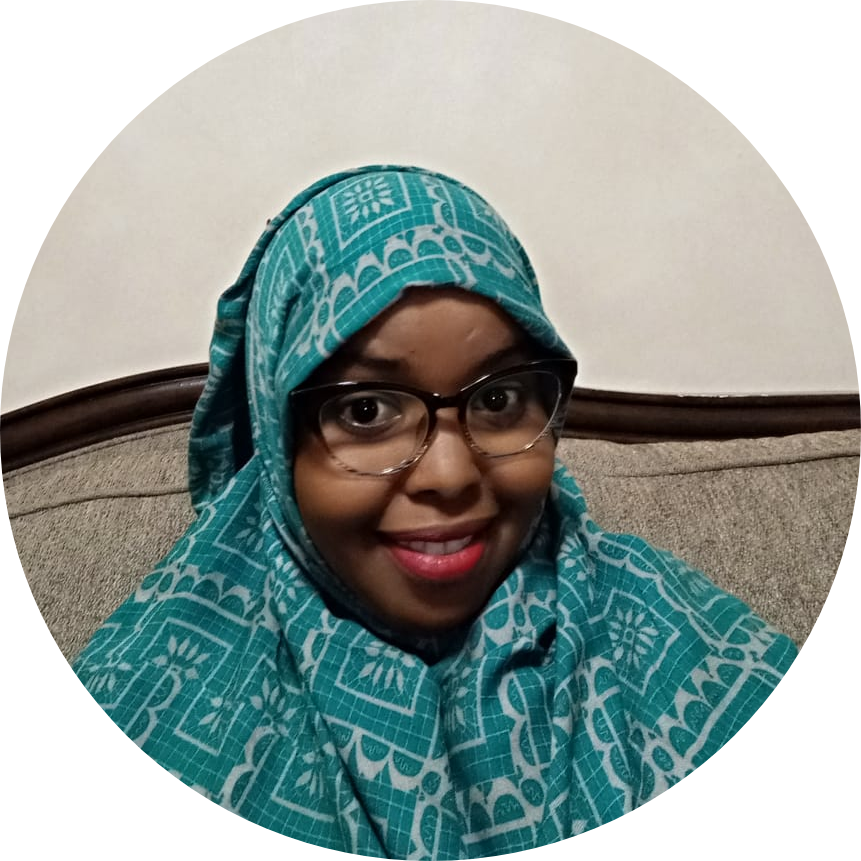WEBINAR SUMMARY – Big data & COVID-19: Tools for agile adaptation: Digital extension & advisories (Eps. 3)
The third episode of our Discussion Series: Big data solutions to COVID-19 & food security, brought together four panelists to discuss tools for agile adaptation regarding digital extension and agricultural advisories.
From using satellite remote sensing to monitor crop harvests to leveraging social media data to track population dynamics that may influence the spread of disease, big data tools and approaches have been instrumental in sensing and responding to the pandemic’s impacts on global food security and supply chains.
As we begin recovering and (re)building resilient food systems, we must leverage the power of big data to examine concepts of resilience and inform our understanding of how digital dynamism enables adaptive food systems in the face of shocks, and, in the longer term, addresses systemic issues in agriculture that have been exacerbated by the COVID-19 crisis.
The third panel, held 14 July, brought together four panelists to discuss tools for agile adaptation regarding digital extension and agricultural advisories.
WATCH THE RECORDING HERE
Here are the main take-aways from each of the speakers:
Ram Dhulipala
Digital Agriculture Theme Leader, International Crops Research Institute for the Semi-Arid Tropics (ICRISAT)
Ram Dhulipala leads the Digital Agriculture Theme at ICRISAT, Hyderabad, where he also leads their iHub innovation center. iHub is a digital incubator where tech start-ups, researchers, private sector companies and government officials meet and share information related to agriculture and extension, as well as ideas about how to reach farmers more effectively. He has extensive experience in architecting solutions in Enterprise IT environments, as well as working in executive positions in the corporate sector in the areas of finance, corporate strategy, program management and mergers and acquisitions (M&A) across diverse sectors. Ram is a strong believer in partnerships and has managed complex projects that bring together people/teams with diverse skills and backgrounds.
Key takeaways from Ram Dhulipala
- E-extension has gained momentum in agriculture, as the frequency and intensity of use has grown many times;
- The iSAT tool, in existence in the last 3 years, is being used in India and Kenya to accelerate value chains; to date, it has helped deliver 150,000 advisories;
- Extension services have experimented a lot with digital tools, especially as field advisors could not be on the ground;
- The market has been forced to look at digital technologies to build back those input value chains that came to a standstill because of the lockdown – e.g. a collaboration between Agrostar and Bayer that helps farmers get easier access to inputs;
- As the lockdown affected labour in agriculture and transporting produce to markets, farmers began increasingly using social media networks to find buyers;
- The government is more open to partner with start-ups, which before were taboo;
- Digital tools have made a huge impact, as peer-to-peer collaboration has broadened, bringing to front the concept of the sharing community. Some start-ups are using drones for agricultural operations and the usage of drones for spraying has emerged in clusters;
- Digital tools are used to aggregate produce and then find buyers;
- Digital platforms are plugging in to streamline logistics, whose importance we have failed to appreciate;
- Fall in love with the problem, not the solution, by placing the problem in farmers’ social and economic context;
- Solutions should be simple and user-friendly, but not simplistic, and digital solutions should blend in with the social and economic realities;
- Human and institutional capacities are equally important, if not more, compared to digital tools;
- IoT for aquaculture is on the rise;
- Leverage local grassroot institutions when implementing digital tools to ensure greater uptake;
- Focus on creating the physical and social underlying structures on which digital tools can build upon.
Madina Amin Hussein
Founder and CEO, Global Nature Conservation
Madina Amin Hussein is the founder and CEO of Global Nature Conservation, an environmental organization based in Garissa, Kenya, that focuses on nature conservation, restoration of degraded ecosystems, and empowerment of women smallholder farmers through teaching them about climate-smart agriculture and sustainable farming. She is a passionate environmentalist who has won awards for her initiatives such as Miti Cash and Throw Seed Technology, which she pioneered with the aim of conserving nature while supporting livelihood improvement of pastoral communities.
Key takeaways from Madina Amin Hussein
- The Miti Cash programme is a citizen science project in conservation agriculture that trains smallholder farmers to become citizen scientists and contribute to climate change adaptation and mitigation;
- The programme test crop varieties in collaboration with smallholder farmers and makes recommendations on the best adaptable species, while also training farmers on climate smart agriculture, sustainable farming and on growing resilient crops;
- The programme is working with 1200 smallholder farmers, who are able to access information in their own local language
- Farmers can also access a digital platform containing relevant agricultural information recorded in their language
- The programme links farmers to the market so they can sell their produce online without intermediaries, who often gain more than the producers;
- The programme also provides a parcel service which farmers can use to ship their goods;
- Training during the pandemic relies on sending videos to groups of 50 farmers, each led by one person;
- Training women farmers includes eco-friendly production, and digital tools usage through video demonstrations.
Jonathan Steinke
Research Fellow, Alliance of Bioversity and CIAT
Jonathan Steinke is a research fellow with the ‘Digital Inclusion’ team at the Alliance of Bioversity International and CIAT. His research focuses on facilitating farmer participation in agricultural research and extension through novel mass-participatory methodologies, such as citizen science, and the use of modern ICT. Through user-centered design with smallholder farmers and extension agents in Tanzania and Kenya, he contributed to developing the ‘Ushauri’ semi-automatized agro-advisory hotline.
Key takeaways from Jonathan Steinke
- Ushuari is part of a collaboration with the public extension service in Tanzania and Kenya that aims to streamline and reinforce communication flows with digital tools;
- Farmers prefer interacting with extension agents and use agricultural radio stations; however, often agents are overloaded and cannot respond to all demands; also, often, farmers’ questions are repetitive;
- Ushuari provides automated IVR hotlines, that help farmers answer their most common questions; farmers can also leave questions that agents can check afterwards via the Ushuari dashboard;
- Recording answers and sharing them via voice messaging is a more efficient way to communicate, especially when agents need to answer the same questions many times; furthermore, agents have more time to focus on providing answers that are harder to communicate;
- Ushuari provides a template that can be used for any organizations and any region, provided this is the right solution.
Shreya Agarwal
Director of Strategy, Digital Green
Shreya Agarwal is the Director of Strategy at Digital Green (DG, digitalgreen.org), a global NGO that uses technology & partnerships to support smallholders increase their incomes. DG focuses on using participatory videos shared via multiple digital channels to strengthen public extension services. Shreya has 10+ years of experience in International Development focused on agriculture and health across India/ Africa & private sector consulting. She has a Masters from Harvard Kennedy School & Institute of Development Studies, and is based in San Francisco.
Key takeaways from Shreya Agarwal
- Using the community video approach allowed to share agronomic practices via local short videos for farmers by farmers through in-person screenings; this reached about 2 million farmers in India and Ethiopia, leading to an increase in uptake of practices by 50% more than through traditional government-based extension services;
- DG worked with government extension services and about 50,000 existing agents to train them; now the government is interested in co-investing 23 million dollars in equipment and training to create an integrated system;
- DG is moving to e-learning modules shared via phone using the Virtual Training Institute – so far about 1,500 extension agents were trained;
- Featuring farmers in the videos, as well as having group conversations after screenings has helped increase the adoption of practices;
- DG is testing also using IVR and online communities to support increased adoption; using IVR in conjunction with video has increased adoption by 21 to 74%;
- Farm and farmer level data can make content more targeted and relevant; DG has a database with 2 million farmers;
- The FarmStack platform helps organizations discover different data sets and share information in a decentralised manner.
July 14, 2020
The BIG DATA Team
CGIAR Platform for Big Data in Agriculture
Cali Colombia
Latest news





 Jonathan Steinke
Jonathan Steinke



